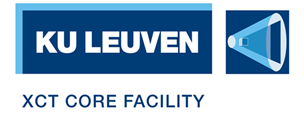
Services
What We Do
The KU Leuven XCT Core Facility has extended expertise in X-ray imaging and makes this expertise available as a non-destructive testing and quality control consultancy service to third parties (universities, research institutes and industry). Our goal is to provide high quality 3D-voxel models and quantitative analyses of the microstructure of materials, at different length scales, by taking advantage of all the benefits that our X-ray Computed Tomography (XCT) platform has to offer. The 3D quantitative analysis is performed using both in-house software and scripts (e.g., VoxTex, Matlab, etc.) and commercial software packages, (e.g., Avizo, CTan, etc.) and includes, amongst others, image segmentation, phase volume fraction, spatial distribution, orientation and morphometric analysis. Advanced modules for segmentation, 3D-voxel model generation, and the analysis of fibrous materials are available. We also offer material modelling based on XCT 3D-voxel models and we are experienced in in-situ time-lapse and dynamic experiments (4D-XCT), where time is considered as the 4th dimension (with temporal resolutions up to < 10 seconds). Ongoing 4D-XCT research in our labs includes compression and tensile testing, imbibition, wetting-drying, capillary uptake, and other functional material behavior experiments. Digital Volume Correlation (DVC) is used to map the displacements and strain in 3D.
Services
- High-resolution XCT imaging of composites, ceramics, additive manufactured parts, building materials, biological and organic materials, geological samples, microelectronics, etc.
- Characterization of the microstructure of materials, with defect detection, feature extraction and quantitative analysis at different length scales
- Digital volume correlation: volumetric displacement and strain field measurements, based on XCT data series acquired at high temporal resolution
- Prototype optimization using XCT
- Production process optimization using XCT
